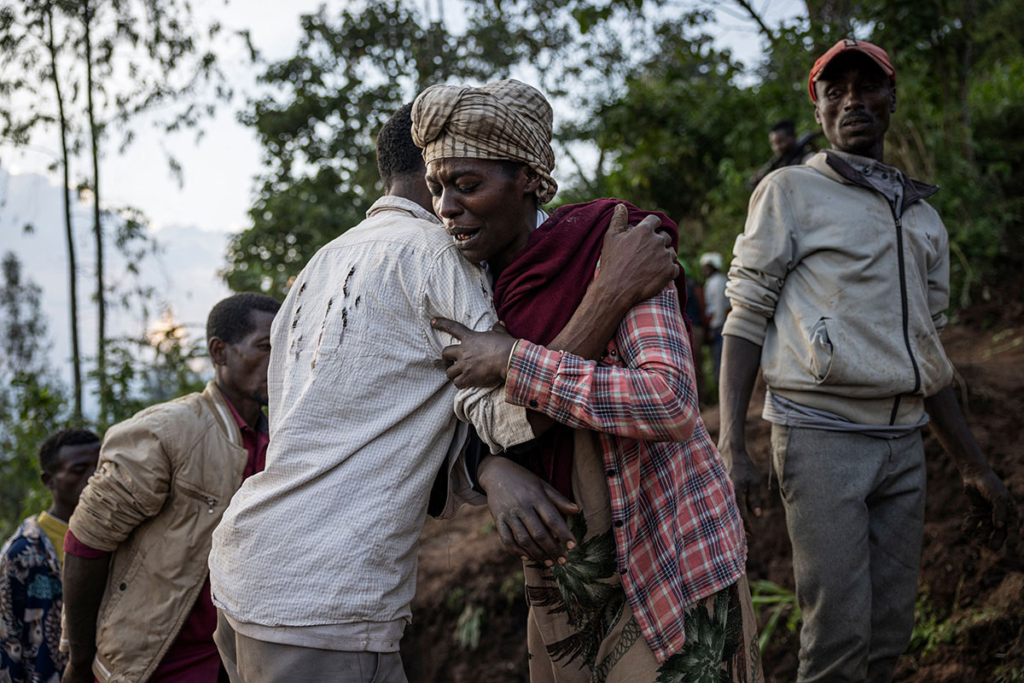
| Emmanuel Barasa |
Ethiopia is in mourning as families grieve the loss of loved ones following a
devastating landslide in the Gofa region.

The disaster, which occurred last week, has already claimed the lives of at least 257 people, with many more still missing. The United Nations Office for the Coordination of Humanitarian Affairs (UNOCHA) has
expressed concern that the death toll could rise significantly, potentially reaching
- Search and rescue operations are ongoing, but the challenging terrain and
unstable conditions are hampering efforts. The Ethiopian government has declared a
state of emergency in the region.
Local authorities and international aid organizations are working together to aid the
affected communities. Emergency shelter, food, and medical care are being provided
to those in need. The Ethiopian Red Cross has mobilized volunteers to help with the
relief efforts. “The situation is dire, and we are doing everything we can to support
the victims,” said Red Cross spokesperson, Alemayehu Bekele. Despite the efforts,
many families are still waiting for news of their missing relatives.
The landslide has had a devastating impact on the Gofa region, with entire villages
buried under mud and debris. Survivors are struggling to come to terms with the loss
of their homes and loved ones. The psychological impact of the disaster is immense,
with many experiencing trauma and grief. “We have lost everything. Our homes, our
families,” said local resident, Amina Tesfaye. Mental health support is being provided
to help those affected cope with the aftermath.
The international community has also extended its condolences and offered support
to help Ethiopia recover from this catastrophic event. Countries from around the
world have pledged financial aid and resources. The World Health Organization
(WHO) has sent medical teams to assist with the emergency response. “The global
community stands with Ethiopia during this difficult time,” said WHO Director-
General, Dr. Tedros Adhanom Ghebreyesus. Efforts are being coordinated to ensure
that the aid reaches those who need it most.
In addition to the immediate relief efforts, plans are being made for the long-term
recovery and reconstruction of the affected areas. The Ethiopian government has
promised to rebuild the damaged infrastructure and provide support for the displaced
families. International organizations are offering technical assistance and expertise.
“Rebuilding will take time, but we are committed to restoring the affected
communities,” said Ethiopian Prime Minister, Abiy Ahmed. The focus is on ensuring
a sustainable and resilient recovery.
The landslide has highlighted the need for better disaster preparedness and
response mechanisms in Ethiopia. Experts are calling for improved early warning
systems and more robust infrastructure. The government is reviewing its policies and
strategies to address these issues. “We must learn from this tragedy and take steps
to prevent future disasters,” said Minister of Urban Development and Construction,
Aysha Mohammed. Strengthening disaster resilience is now a priority for the country.
Climate change is being cited as a contributing factor to the increased frequency and
severity of natural disasters in the region. Scientists are warning that more extreme
weather events can be expected in the future. Efforts are underway to mitigate the
impact of climate change and adapt to its effects. “We must address the root causes
of these disasters, including climate change,” said environmental scientist, Dr.
Mekonnen Assefa. Sustainable development practices are being promoted to reduce
vulnerability.
The community spirit in the Gofa region has been remarkable, with people coming
together to support each other during this crisis. Volunteers from neighbouring areas
have joined the relief efforts, providing much-needed assistance. Local businesses
are donating supplies and resources. “In times of disaster, our unity and solidarity
are our greatest strengths,” said community leader, Mulugeta Abebe. The resilience
and compassion of the people are shining through in these difficult times.
As the search and rescue operations continue, hope remains that more survivors will
be found. The dedication and bravery of the rescue teams are being praised. Efforts
are being made to ensure that all possible resources are utilized. The government is
coordinating with international partners to enhance the effectiveness of the
operations. “We will not rest until every missing person is accounted for,” said head
of the search and rescue team, Colonel Tesfaye Negash.
The road to recovery for the Gofa region will be long and challenging. However, with
the support of the national and international community, there is hope for rebuilding
and healing. The focus now is on providing immediate relief and planning for the
future. “Together, we will overcome this tragedy and emerge stronger,” said Prime
Minister Abiy Ahmed. The resilience and determination of the Ethiopian people will
be key to their recovery.




